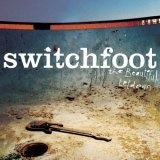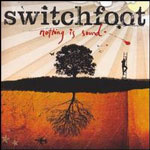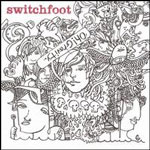Features
Switchfoot's Jon Foreman: The Daily Vault Interview
by Jason Warburg
San Diegans Jonathan Foreman, his brother Tim and their friend Chad Butler started Switchfoot while Tim was still in high school and the other two were at UCSD. Their original format was the classic power trio with Jon on guitar and lead vocals, Tim on bass and background vocals, and Butler behind the drum kit. Older brother Jon was -- and is -- both a major Led Zeppelin fan and an avid surfer; Switchfoot is a surfing term. The band issued three albums as a trio: The Legend Of Chin (1997), New Way To Be Human (1999) and Learning To Breathe (2000), steadily building a following before signing with In the midst of all this activity, Jon Foreman found time to record the first two of a series of four seasonally-themed, Internet-only solo EPs. Fall came out November 27 and is available via iTunes and Foreman's Web site. We caught up with Jon Foreman via e-mail recently, just days before he boarded a plane to catch his boyhood idols’ December 10 reunion concert in London. | 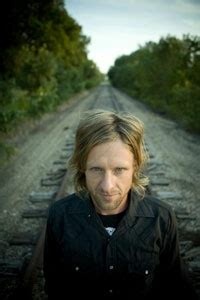 |
Daily Vault: Please tell us about the Appetite For Construction Tour tour and how it came about.
Jon Foreman: The idea came about one day when we were playing in Austin, Texas. We were hanging out by a river talking about how we could do the touring thing differently. We were looking back at three years of doing the Bro Am [an annual charity event Switchfoot sponsors in San Diego] and we were thinking about how amazing it would be to dive into other communities as well.
We wanted to find a low-overhead organization that folks could get directly involved in on a local level. Habitat for Humanity was a perfect fit. Two things are needed for the job site: funding and personnel. This tour helped accomplish both -- thousands of kids signed up to get involved and the tour and the song we wrote for the tour raised more than $100,000 for Habitat. It was such a dream to see it all come together!
I gather you’ve been friends with the guys in Relient K for awhile. How would you describe them and their music to your own fans?
We’ve been friends with the RK boys for a while… They were the local opener on a tour we were on back in the day, so it’s been great to see them evolve as a band and to be cheering them on. Matt is almost like a little brother to me and I have a ton of respect for him and his tunes. His music is extremely deceptive -- happy-clappy pop-punk songs that have as much depth as you want to dive into. Witty, honest, darkly personal songs in a candy coated shell.
Back to Switchfoot. You guys fought your way through the indie world for years, signed the major-label deal that every independent band *used to be* shooting for, put out three albums with
It’s all about trust. We started this thing as a family -- my brother, my friend and myself writing songs we believed in and playing ‘em.
We found some folks that we really trusted over at
So we decided to move on. No hard feelings, just wanting to protect the music we believe in.
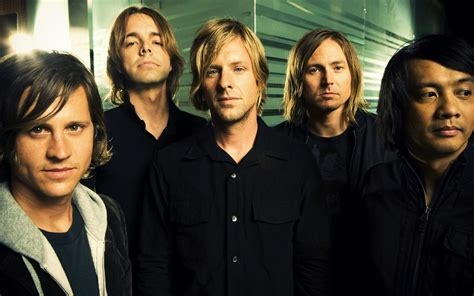
Switchfoot: (l to r) Tim Foreman, Drew Shirley,
Jon Foreman, Chad Butler, Jerome Fontamillas
The path you’ve traveled -- which is getting more and more well-traveled -- begs the question: are big labels obsolete?
I’m not sure, I can only speak from my perspective: there’s got to be a deeper motivation than the bottom line for me to feel fulfilled by what I do. And that motivation is hard to find at the big labels nowadays…
A lot of artists see file sharing as a mixed blessing -- great for initial exposure, but terrible over the long haul if you’re trying to make a living playing music. What’s your take on file sharing and especially its effects on independent artists?
Hmmm... We've always made a living by playing live music. We just played the biggest tour we've ever had with no new record around. Weird...
File sharing is our reality. It’s like asking whether or not you feel clouds are good or bad: they’re both good and bad I suppose but wishing them away ain’t gonna help! I really love vinyl but I doubt we’ll ever move back. The question for me has always which songs will change my world.
Switchfoot has been through a lot of changes over the years, building a mainstream audience, adding two members and expanding the scope of your sound. Looking back on it now, how do you see the evolution of the band having affected the music and you personally?
I feel like most of these changes have been attempts to arrive at an ever-changing destination. A lot of times, (like now for example!) we start a record hoping to go in one direction and finish the project with a completely different objective. That’s why live music can be so fulfilling -- because the goal and the attempt happen simultaneously.
I’m thankful for the songs, though. I feel like they have been gifts, it’s a gift to be able to sing a song you believe in night after night. To get a chance to give birth to something that you really care about. That has been the constant within the changes.
You guys seem to be always recording, always pushing toward the next release. Anything you can tell us about the next band album yet?
The reason why I love music is because it has this intangible spark, this once-in-a-lifetime urgency that breathes down the neck of my soul and makes me cry or laugh or throw something. So you dive into music and begin to learn how things work, the mechanics, the rules. And suddenly it becomes math instead of magic.
I feel like the most dangerous place for us to be as a band is to be comfortable. The rule for this record is that if you’ve done it in the past you can’t do it again. We want the music to move us. I heard somebody say -- “If you ain’t crying, why you playin’ it?” I like that…
We recorded 14 songs with Charlie Peacock [producer of Switchfoot's initial trio of indie albums] this summer. Our first approach was to take a song and play it for an hour or two and then listen back to what we achieved and move forward from there. It's completely new for us -- we've never "jammed" before.
There is a searching quality to your songs; they ask the questions at the core of every human’s experience: why am I here? Does my life have a purpose? What does it mean to be a good person in this world? In your music, you guys approach spirituality in an open-ended way, making it mostly about asking the questions rather than preaching a particular set of answers. Was that a conscious choice, or more of a natural outcome of how you approach your own life?
I’ve never possessed the ability to write good songs where I am not emotionally involved. The questions that I’m asking are not rhetorical. The songs are my vehicles to try and understand the world. Often I find that I can be far more honest in a song than in real life. I’m working on trying to figure that out…
A lot of your lyrics focus on spiritual issues, and you’re also frontman for a rock band. One thing spiritual leaders and rock stars have always had in common is a tendency to attract some pretty intense followers, people who have a really deep-seated need to believe in someone. How would you describe your experiences with so-called “superfans”?
For the most part, I feel incredibly honored when I think about the folks that listen to our songs. Most of them are amazing people that inspire me… When someone tells me that one of our tunes helped encourage them to join the peace corps I’m blown away. And that type of thing happens all the time. People who treat us strangely simply don’t understand our tunes… Seldom do I run into folks that love the music that don’t understand who we are.
A columnist in the New York Times wrote recently about the fragmentation of music, how it’s all genre-driven now and there are no more universal acts like the Beatles or Led Zeppelin or U2 that everyone listens to. To me that argument both rang true and paralleled your lyric in “Lonely Nation.” The more choices we have, the more we’re able to customize the world we come in contact with, the lonelier we get, because we’re no longer sharing experiences in a communal way. How do you react to that idea?
If I understand the comment correctly, I feel like the columnist got it wrong in some ways. With the death of radio and the birth of the iPod, nothing is genre driven -- what’s the difference between rock, or alternative or indie? James Taylor is in the rock section at iTunes. Most big “indie” bands are on a major. And alternative is even more confusing. Everyone listens to everything; it’s all Jack.fm.
I do feel like the universal experience is dying, however. There are too many options to have an Elvis come on the scene. I suppose hip-hop is the closest thing to universal. And yet community is a huge part of the human experience. Even in cyberspace we’re searching to belong somewhere, looking for community. But often things are moving too fast. Even in music, too many choices can lead to mediocrity. Every good record was made by the restrictions placed around the music, i.e. time, budget, ability, ambition.
Aside from life expectancy, who’s to say that our modern human existence is fundamentally better now than it was two thousand years past. War, famine, disease, greed, murder… machines do many things but they cannot save us from ourselves. And I haven’t found one that cures loneliness. We have created a modern day serfdom of sorts: we slave away, chaining ourselves to our devices and giving the first fruits to the global corporations.
Many people see a gulf in American society today between the faithful and the secular. People on both sides of that continuum seem to have become more rigid in their views of each other. I’ve read about ardent Christians grousing because you guys don’t just write worship songs, and also about ardent secularists being put off by the spiritual messages your lyrics contain. And then there are people like me – a spiritually seeking agnostic who’s somewhere in the broad middle, and who finds your music resonates deeply with me precisely because it’s spiritual but not dogmatic. What do you make of that?
I think people throw rocks at the things they don’t understand. We’ve always attempted to make music for thinking people. Some of these folks are Christian, or Jewish, or Taoist, or determinist, or dentists, or plumbers… It’s absurdly close-minded to think that we should all only listen to and fraternize with folks who think like we do. That’s the way fascism grows! I love people that I disagree with. I listen to them. They listen to me. Sometimes we never see eye to eye, but we still hang out, we still care for each other. If you don't love people you disagree with, you won't have many friends!
I feel like music is one of the few areas in our rigid world where tolerance is still found. To box it up into something more organized would be many a journalist’s dream and many a music lover's nightmare!
You’re planning to release four solo EPs of six songs each over the next 12 months. How did that idea develop?
I had these personal songs that didn’t belong on a Switchfoot record and yet they kept coming to me. I just kept recording them at home every night never thinking that they would ever see the light of day.
Everything felt very natural, very honest -- I paid for everything myself, and recorded most of it on my own. For most of the project I had no idea that people outside my family and friends would actually ever hear these songs, maybe that’s why they’re so personal. I am so excited to get these tunes out, it’s a dream come true in many ways.
The EP format felt like the right way to go: no real fanfare, just a continuous yearly flow of 24 honest songs created for the moment. Every song gets the attention it deserves and there are no singles.
 |
|
I’ve listened to Fall and my initial take is that the songs are both quieter and more personal and specific to you than the average Switchfoot song. They’re almost like hymns you might sing to yourself. How do you see these songs?
These songs reflect the hours and they were made and the purpose they had. I wrote and recorded these songs late at night at my house after the world was sleeping. For the most part they were written as a personal consolation for pain.
In my first listen I caught some strings and horns and other fresh textures in the music. Do you have some guest players with you on some of the EP tracks?
Yes. After I got the basic tracking done I flew to
Let's see... Jeff Coffin of Flecktones fame was amazing… Charlie Peacock played and helped with direction overall. Keith Tutt was the secret weapon on the cello. Tim [Foreman] and Jerome [Fontamillas] from the Foot helped me in a few spots too… Stacy DuPree from Eisley sang on Winter…
Anything else you’d like to tell folks about future plans for the EPs?
Winter beat Fall for me… which is unfortunate because fall is my favorite season. I haven’t started on spring or summer and I really have very little direction at this point. I want the mood to change for those disks to represent the seasons but I still want the honesty... I'm trying to employ the production and the song selection to get there.
Finally, a three-part random bonus question: Any secret musical vices? What’s your favorite ‘80s metal band? What was the first album you ever bought?
Vices, hmmm... I'm not sure what you mean, a vice as a weakness of musical character? Well, I need a good crowd to play a good show. I wish I were a bit less caring, like Dylan or something... but my experience onstage is often far too influenced by what type of crowd we have. I play from their perspective.
I guess I don't really have a favorite ‘80s metal band. I was too into Zeppelin and surfing in junior high... the leather pants and the makeup scared me off. But I loved the lighter stuff, "Pour Some Sugar On Me" was the best thing I had ever heard...
I think it’s Chuck Klosterman who has some good stuff to say about guilty pleasures. Something like: a guilty pleasure is something that you like that you think you shouldn’t like. But who’s to say you shouldn’t like it? Who’s to say that someone else’s opinion should mean more to you than yours? In the end, why should you be embarrassed about something that brings you joy?!
I can't remember what record I bought first, but the first tape I got was a birthday gift from my elementary school friend: Whitesnake... "I'm going down the only road I've ever known!" Yes indeed!
[Many thanks to Jon Foreman and Jamie Sisley of Red Light Managament for making this happen.]
